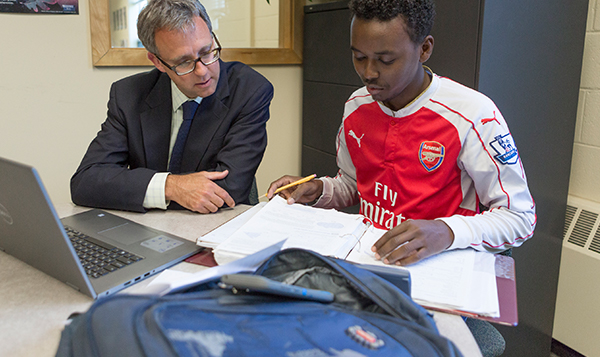Dear High School, I Wish I’d Had a Personal Finance Class

From 25 to 29 and Counting: Personal Finance Education Requirements
When I started this blog in April of 2024, there were 25 states that had passed legislation requiring high school students to take a personal finance course before graduation.
As of June 22, 2025, the club has grown to 29 with Texas being the latest to join following California (June 2024), Kentucky (March 2025), and Colorado (May 2025).
No, Maine is not there yet, but financial education is still happening – in classrooms, at home, in blogs…
News from the Classroom
In July, FAME held its Personal Finance Summer Institute, hosted by Waynflete School in Portland and taught by yours truly, along with John Raby from Thornton Academy in Saco, and Shiho Burnham from Baxter Academy in Portland. This was the second year for this course, and the 14 students in attendance represented Portland High School, Baxter Academy, Deering High School, Casco Bay High School, and Brunswick High School. What makes that list even more special is that John Raby joined me to teach this course partly as preparation for this fall when he will be teaching Thornton Academy’s first ever personal finance class (and Shiho used this course to provide her with more tools for Baxter’s existing personal finance offering).
The 24-hour course covered banking, saving, investing, credit, credit scores, economics, insurance, taxes, and budgeting. In fact, budgeting was the cornerstone of the class and allowed students to build a 12-month fictional stage of life budget. Most importantly, the budgeting part of the Summer Institute was designed to foster a skill for life, and the students now have a deeper understanding of how to use a budget and why it is a crucial item in the personal finance toolbox.
Also, by the time this post is published, I will have started teaching a semester-long personal finance course at the Maine College of Art & Design. Not surprisingly, budgeting is the foundation and ongoing thread of that course.
Personal Finance Quiz Pop-Quiz
All of this teaching and thinking about personal finance course requirements has me in outcomes mode. So, the teacher in me says, it’s pop-quiz time. Let’s go with three divisions – youth, high school, and adult. No fancy technology here, so you’ll have to scroll to the end to check your answers. (Questions compiled from a variety of sources, including my own classes.)
Youth Division (up through grade 8)
- Why does money have value? (Why can we buy things with it?)
- Our money is made of a very rare form of thin, green, gold leaf
- We believe (we have faith) in what it represents
- It grows on trees
- What are savings?
- Money that we use to buy hot dogs
- Money that we give to our friends to fix their skateboards
- Money that we put aside to pay for things in the future
- What is the best plan for your next $20?
- Spend all $20 at the movies, definitely paying $8 for popcorn
- Save $5, spend $10 at the movies, spend $5 on a gift for mom
- Dig a hole in the yard and bury the $20
- What is an example of something you need?
- Food and water
- Video games
- $200 Messi jersey
- What’s the secret to long-term success with money?
- Spend everything you make
- Spend more than you make
- Spend less than you make
High School Division (up through age 18 or so)
- When deciding what to buy, the best plan is to:
- Always go with the cheapest option
- Always go with what is popular
- Always think about the relationship between the cost and the benefit
- What is a budget?
- A spending plan
- A statement showing how much money you earned last year
- The amount you can spend using a credit card
- Investing in stock means:
- Loaning money to the government
- Owning a part of a corporation
- Opening a business
- Which is a type of bank account that pays a fixed rate of interest for a fixed term?
- Checking account
- High-yield savings account
- Certificate of deposit (CD)
- What’s the secret to long-term financial success?
- Spend everything you make
- Spend more than you make
- Spend less than you make
Adult Division (everyone else)
- Which of these is your friend when you save and your enemy when you borrow?
- Dividends
- Compound interest
- Time
- Which type of policy is managed by the Federal Reserve Bank in order to promote stable prices and full employment?
- Fiscal policy
- Monetary policy
- Foreign policy
- Which investment generally carries the highest risk?
- Single stocks
- Money market savings accounts
- Stock mutual funds
- Which mortgage will cost the most in the long run? (no calculators, just instinct, rate on 15 year is .5% lower)
- $2000/month for 30 years
- $2800/month for 15 years
- Everything matters; interest rates, credit score, income, health, luck… However, all things being equal, what’s the secret to long-term financial success?
- Spend everything you make
- Spend more than you make
- Spend less than you make
*****
As I wrote this post, I thought about those questions and about Maine’s progress towards a personal finance graduation requirement, and I wondered:
- Would a personal finance class have made a difference for me?
- Would it have helped me avoid my wasted financial decade, known as my 20s?
- How much will it help today’s students to prepare for their financial futures?
For my part, I can only say that I wish that I had had the chance to find out. I wish that learning about the risks of credit cards had crossed my desk before the credit card companies passed out the free t-shirt along with a $500 limit gateway card.
For the current high school generation, a note from one of my summer students commenting on the role of money and on how learning about money has prepared him for life after high school.
“To me, money is not status. It’s the ability to make my own choices. It’s the idea to invest in myself, the discipline to save for tomorrow, and the understanding that money won’t make me happy, but it will give me the setting where happiness can root.”
Yep, that’s why I do this work.
Answers Youth: b, c, b, a, c
Answers High School: c, a, b, c, c
Answers Adult: b, b, a, a, c
About the Author:
Steve has worked on financial literacy efforts in Maine since 2004, and in July 2023 he started at FAME as a Financial Education Programs Specialist. He is an Accredited Financial Counselor (AFC®), a WISE-Certified Personal Finance Educator, has a B.S. in economics from Southern Connecticut State University, an MBA from the University of Hartford, and served as a U.S. Peace Corps Volunteer.
In the fall of 2003, he started a 20-year connection to the Waynflete School in Portland, where he taught math and personal finance, advised middle and upper school students, and coached baseball. Steve worked with students to create the Finance Club and an award-winning LifeSmarts team (Nationals 2013, 2014, and 2015). In 2011, Steve coached a Waynflete team to victory in the Boston Federal Reserve Economics Cup Challenge.
Steve was named Maine Jump$tart Financial Educator of the Year for 2012, was the keynote speaker at the Maine Jump$tart Annual Teacher Conferences in 2015 and 2023, and was Maine Jump$tart’s training coordinator from 2017 to 2023.
Steve and his family moved to Seville, Spain in July 2016 where he taught English and business English and learned many new personal finance lessons. He now lives in Portland with his wife and their son.





